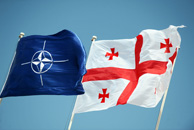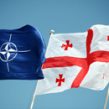
NATO Demonstrates Full Support for Georgia
Publication: Eurasia Daily Monitor Volume: 7 Issue: 217
By:

On November 23, as Georgians marked the seventh anniversary of the Rose Revolution, a peaceful popular protest that opened new opportunities for the South Caucasus nation’s Euro-Atlantic integration, President Mikheil Saakashvili affirmed the country’s European identity as he addressed the European Parliament.
(https://www.president.gov.ge/index.php?lang_id=ENG&sec_id=228&info_id=5857)
On November 19-20, Saakashvili attended the NATO Summit in Lisbon, where he held bilateral talks with Western leaders, including US President, Barack Obama. Earlier, on November 16, the NATO Parliamentary Assembly adopted a resolution that is highly favorable to Georgia (https://www.nato-pa.int/default.asp?SHORTCUT=2245). Encouraged by all of these developments, Saakashvili commented that this was “probably the most successful week” in almost seven years in office and a “great victory” for Georgian diplomacy (Rustavi-2 TV, November 20).
This characterization does not seem to be an exaggeration. The account of the first meeting between Obama and Saakashvili published by the White House said that Obama “reaffirmed US support for Georgia’s sovereignty and territorial integrity…expressed his appreciation for Georgia’s significant contributions to the ISAF [International Security Assistance Forces] mission in Afghanistan…[and] discussed the Georgian government’s efforts to implement political, economic, and defense reforms and our shared interest in securing democracy, stability, and prosperity in Georgia” (https://www.whitehouse.gov/the-press-office/2010/11/19/read-out-presidents-bilateral-meeting-with-president-saakashvili-georgia).
The Lisbon NATO Summit Declaration, decoupling NATO-aspirant Georgia from Ukraine, whose leadership no longer sees membership of the Alliance as a national priority (at least for the time being) introduced a separate paragraph for Georgia stating: “at the 2008 Bucharest Summit we agreed that Georgia will become a member of NATO and we reaffirm all elements of that decision, as well as subsequent decisions” (https://www.nato.int/cps/en/SID-5426623F-5D36B810/natolive/official_texts_68828.htm?mode=pressrelease). The document also reiterated NATO’s “continued support for the territorial integrity and sovereignty of Georgia within its internationally recognized borders… [and called on] Russia to reverse its recognition of the South Ossetia and Abkhazia regions of Georgia as independent states,” urging Moscow “to meet its commitments with respect to Georgia, as mediated by the European Union” in August 2008.
The NATO Parliamentary Assembly resolution went even further, by openly calling the Georgian provinces of Abkhazia and the Tskhinvali region/South Ossetia “occupied territories” and expressed concern over the “continuing failure by the Russian Federation to comply fully with the provisions of the EU-brokered Ceasefire Agreement, and particularly its failure to withdraw to the positions it held before the conflict.” Furthermore, the NATO parliamentarians called on Moscow “to reverse the results of…the ethnic cleansing” and “allow the safe and dignified return of all internally displaced persons to their homes” (https://www.nato-pa.int/default.asp?SHORTCUT=2245).
On November 23, at the European Parliament, which Saakashvili called “a symbol of hope,” the Georgian president announced a new step in his country’s policy of what he described as constructive unilateralism. Saakashvili pledged that Georgia “will never use force to restore its territorial integrity and sovereignty [and] that it will only resort to peaceful means in its quest for de-occupation and reunification”.
(https://www.president.gov.ge/index.php?lang_id=ENG&sec_id=228&info_id=5857)
“Even if the Russian Federation refuses to withdraw its occupation forces, even if its proxy militias multiply their human rights violations, Georgia will only retain the right to self-defense in the case of new attacks and invasion of the 80 percent of the Georgian territory that remains under [the] control of the Georgian government,” Saakashvili declared. Given the constant Russian threat, Saakashvili argued, Georgia was “building a democracy at a gunpoint.” Speaking as the representative of the entire South Caucasus, the Georgian leader urged, “It [was] high time for the European peace to be extended to the South Caucasus.”
The non-use of force commitment in the European Parliament and in the subsequent letters Saakashvili sent to the UN, the Organization for Security and Cooperation in Europe (OSCE) and several Western leaders was a formalization of what began in August, when he told the Russian radio station Ekho Moskvy that Georgia planned to minimize the threat of renewed Russian aggression by “officially formalizing” the fact that it has no intention “to use military force against the Russian occupation.” In Saakashvili’s view, Georgia’s unilateral decision would “quell and disarm” those in Russia who are thinking of solving the “Georgian question” by military means (https://echo.msk.ru/programs/beseda/706011-echo). That Saakashvili made the formal announcement in the European Parliament, Georgian analysts argue, has symbolic significance underlining Georgia’s European identity.
But the pledge, first and foremost, should be considered within the context of the latest NATO decisions on Georgia and the meeting Saakashvili held with Obama. Making Tbilisi feel comfortable with the Russia “reset policy” has long been problematic for the Obama administration, despite many statements in Washington that Georgia’s sovereignty and territorial integrity would not consequently be jeopardized. After the Obama-Saakashvili meeting and the recent NATO commitments vis-à-vis Georgia, Tbilisi feels more assured. Many Western leaders from the EU and the US highly praised the Georgian president’s new initiative (https://www.president.gov.ge/index.php?lang_id=GEO&sec_id=226&info_id=5915).
Nonetheless, Georgia remains vulnerable. Not yet a NATO member and without any international security guarantees, it faces many significant challenges, all stemming from the fact that building a sovereign democracy under Russia’s shadow is a daunting task. With some 12,000 Russian troops stationed in the Russian-occupied Georgian lands of Abkhazia and the Tskhinvali region/South Ossetia and hundreds of thousands of victims of ethnic cleansing from those territories unable to return home, Tbilisi’s constructive unilateralism may minimize the risk of renewed Russian aggression but in isolation it cannot remove it. What Tbilisi needs most is greater US and European engagement in resolving its outstanding problems with Moscow. Now that Georgia has vowed that it has no plans to end the Russian occupation by military means, the undeclared Western arms embargo against Tbilisi must, logically, end and the country should be provided with sophisticated defenses to further diminish the risk of a new invasion. But even more importantly, the patience and maturity of the Georgian government must be rewarded by more closely embracing the country and, perhaps the entire South Caucasus region.




